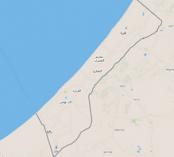
A continuous wave of wars has plagued the Palestinian people both physically and mentally. Gaza’s hospitals and homes are still in shambles a year after the latest offensive. But apart from death tolls, relief efforts must also place emphasis on the enduring mechanisms of the Israeli Occupation and how they affect the healthcare chain of supply and demand. The glaring restriction on mobility that is the hallmark of the Occupation prevents medical students from traveling abroad to specialize and patients from accessing points of care. The political power vacuum borne out of the rift between Hamas and Fatah to fill the void of an independent nation has left the PA weak and unable to devote resources to the healthcare system. The Occupation is the chief structural barrier to the access of quality healthcare for Palestinians—it has exacerbated existing inequities in the population and has given rise to a host of issues unique to the devastating political reality.
Even when there is no incursion happening, the Occupation is inherently suffocating. Healthcare is not just measured in mortality statistics or disease prevalence. National health systems are highly influenced by the political climate surrounding them, and as Norwegian physician and activist Mads Gilbert puts it, “Medicine and politics are Siamese twins.” If political arguments are not working as fast as they should to end the Occupation – perhaps the healthcare argument—the human argument—will have better luck.
Access – The Pivotal “Intermediate” Outcome
Some egalitarian liberals believe that society has a particular obligation with regard to healthcare—as opposed to a different camp that asserts that the best way to respect moral capacity is to distribute income fairly and let individuals purchase the healthcare they want. But is it the role of the state to provide a blanket of basic healthcare services, or is it the individual’s actual health status that needs to be considered? Do we judge rights by the availability of clinics or by life expectancy? In “Getting Health Reform Right,” a text written by Harvard School of Public Health Professors Marc Roberts, William Hsiao, Peter Berman, and Michael Reich elucidate “the disagreement over whether the government should be responsible for an agreed level of health status or for access to health care, [which] has important implications for the relationship between the state and the individual.” The case of Occupied Palestine transcends the normative issues of public health that are entangled among individual behaviors and socio-economic strata within the society itself. Palestinians are embedded within a political framework in which they are physically unable to get to places of care, or care is physically shut off from them as a result of military occupation and the social, structural, and economic consequences that come with it.
Roberts et al call access an “intermediate performance characteristic” of a health system because they are not themselves ultimate objectives. But access is the primary limiting factor to health system performance and health status in the Occupied Palestinian Territories. While access to healthcare is by no means the only failing health metric plaguing the Palestinians today, it is the Occupation specifically that is precluding this access. There is a direct link between political process and an inequitable access to health care that has made it impossible for a cohesive health system to exist in a way that can be effectively utilized.
Access can simply refer to whether services are offered in a specific area (physical availability), or to how easy it is for citizens to get care (effective availability). Access can also correlate to utilization. In the case of Palestine, low usage of health services reflects barriers to care. Effective availability is influenced by what services are offered where, at what prices and on what terms. It is an intermediate performance characteristic that is “both a consequence of policy and a cause of performance.” In the case of Palestine, access is a rigid fork in the system that cannot be improved without the removal of the Occupation.
The article continues on the Mondoweiss site at http://mondoweiss.net/2015/08/constraints-palestinian-territories.

